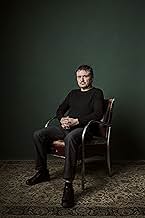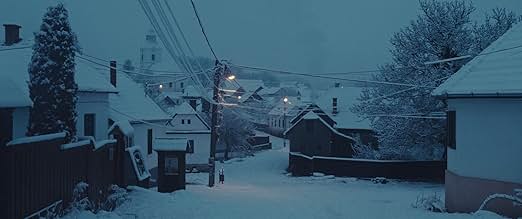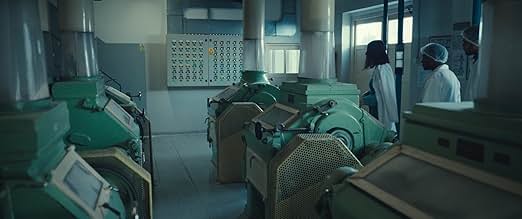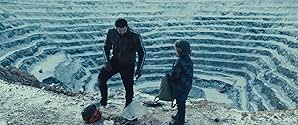IMDb रेटिंग
7.2/10
6.3 हज़ार
आपकी रेटिंग
अपनी भाषा में प्लॉट जोड़ेंA non-judgmental analysis of the driving forces of human behavior when confronted with the unknown, of the way we perceive the other and on how we relate to an unsettling future.A non-judgmental analysis of the driving forces of human behavior when confronted with the unknown, of the way we perceive the other and on how we relate to an unsettling future.A non-judgmental analysis of the driving forces of human behavior when confronted with the unknown, of the way we perceive the other and on how we relate to an unsettling future.
- पुरस्कार
- 7 जीत और कुल 18 नामांकन
Endre Rácz
- Tibi
- (as Rácz Endre)
फ़ीचर्ड समीक्षाएं
I don't know this director from Roumania, some kind of a Roumanian Ken Loach, but I guess he is one of the best on the market. I will try to check what he did besides this one. It is not a light hearted story, it speaks of something very serious, dark, realistic, gritty. A tale about racism, intolerance, human behaviour, towards strangers, especially if they are foreigners come to work. I am sure it is like this in many countries, many places. This is not an easy topic to speak about. It is very well told, shown. It may be disturbing because too close to reality, to actual events and tragedies which we don't necessarily hear of.
Greetings again from the darkness. Welcome to 'Hypocriteville". Or the town of Bigotry. Or Xenophobia City. Regardless how vile each of these labels might be, they each fit in the Transylvania community at the heart of writer-director Christian Mungiu's latest film. Of course, as with most derogatory labels, the accused would never admit the shoe fits, and paraphrasing Shakespeare, would likely protest too much. Mungiu's brilliant 2007 Palme d'Or winner 4 MONTHS, 3 WEEKS AND 2 DAYS was inexplicably not nominated for a Best Foreign Language Oscar, and he proves again his unique mastery of the medium.
Our introduction to Matthias (Marin Grigore) occurs as he violently head butts his rude supervisor after being disrespected. Matthisas then returns to his home community where he encounters Ana (Macrina Barladeanu), the mother of his young son. Rudi (Mark Edward Blenyesi) is 8 years old, and he has recently witnessed something in the forest that has frightened him into silence. Ana does what she can to comfort him, while Matthias pushes him to 'man up' and face his fears. Matthias also re-connects with his former lover, Csilla (Judith State), who is the manager of the local bakery in town.
Csilla is working diligently to hire more employees at the bakery in order to qualify for grant money. The problem is that no locals want to work for minimum wage. Instead, many locals head to Germany and other areas for higher paying jobs, and the conflict arises when Csilla hires a couple of men from Sri Lanka. It's at this point where this mishmash of citizens begins their racist rants ... this despite being a mixed community where many friends and family member have headed out to find jobs in other areas. "Not in my backyard" is a phrase used so often in communities fighting against some cause, and that's exactly what's happened here.
Mungiu's excellent film peaks with a 15 minute (or more) single take scene - a town hall meeting where a couple of dozen citizens speak out showing their small-mindedness. It's painful to watch, yet also mesmerizing. Csilla and Matthias are front and center for the scene and both are superb, especially Csilla's facial reactions and Matthias' cowering (this after flaunting his powerful masculinity for so much of the film). By the time this scene concludes, this viewer was mentally exhausted while also being in awe. It's this reaction which makes that final scene so confounding and seemingly out of place. Mungiu taps into the human behavior that we so often question these days, and he does so in a way that never preaches or judges. It's truly exceptional filmmaking ... except that final scene.
Opens April 28, 2023.
Our introduction to Matthias (Marin Grigore) occurs as he violently head butts his rude supervisor after being disrespected. Matthisas then returns to his home community where he encounters Ana (Macrina Barladeanu), the mother of his young son. Rudi (Mark Edward Blenyesi) is 8 years old, and he has recently witnessed something in the forest that has frightened him into silence. Ana does what she can to comfort him, while Matthias pushes him to 'man up' and face his fears. Matthias also re-connects with his former lover, Csilla (Judith State), who is the manager of the local bakery in town.
Csilla is working diligently to hire more employees at the bakery in order to qualify for grant money. The problem is that no locals want to work for minimum wage. Instead, many locals head to Germany and other areas for higher paying jobs, and the conflict arises when Csilla hires a couple of men from Sri Lanka. It's at this point where this mishmash of citizens begins their racist rants ... this despite being a mixed community where many friends and family member have headed out to find jobs in other areas. "Not in my backyard" is a phrase used so often in communities fighting against some cause, and that's exactly what's happened here.
Mungiu's excellent film peaks with a 15 minute (or more) single take scene - a town hall meeting where a couple of dozen citizens speak out showing their small-mindedness. It's painful to watch, yet also mesmerizing. Csilla and Matthias are front and center for the scene and both are superb, especially Csilla's facial reactions and Matthias' cowering (this after flaunting his powerful masculinity for so much of the film). By the time this scene concludes, this viewer was mentally exhausted while also being in awe. It's this reaction which makes that final scene so confounding and seemingly out of place. Mungiu taps into the human behavior that we so often question these days, and he does so in a way that never preaches or judges. It's truly exceptional filmmaking ... except that final scene.
Opens April 28, 2023.
This is not a film for those of us who watch movies casually. If you pay close attention to the gloriously intricate details of this film, the ending will leave you speechless and full of ruminations for days (maybe even weeks) to come.
The characters in this film are not cartoonish one-note ideas -- they're complex full human beings. We have a brilliant anti-hero as our lead, a morally-confused "working woman" type as our second lead, and a village whole as our third lead. Think this sounds boring? Give the film a chance and let it seep in. It's firing on all cylinders - beautiful, moody, dark, socially-relevant without being preachy or preening.
Mungiu is a master and has yet to make a bad movie.
The characters in this film are not cartoonish one-note ideas -- they're complex full human beings. We have a brilliant anti-hero as our lead, a morally-confused "working woman" type as our second lead, and a village whole as our third lead. Think this sounds boring? Give the film a chance and let it seep in. It's firing on all cylinders - beautiful, moody, dark, socially-relevant without being preachy or preening.
Mungiu is a master and has yet to make a bad movie.
RMN is the Romanian translation of "MRI" - the medical machine which takes deep images of the human body including the brain. In a way, renowned Director Cristian Mungiu (4 MONTHS, GRADUATION) is examining the inner souls of his fellow countryman. An X-Ray if you will.
Mungiu's screenplay is set in a small Transylvanian village. Mattias (Marin Grigore), a brute of a man, has returned from a job for hire in Germany to reunite with his estranged wife Ana (Macrina Barladeanu) and young son Rudi (Mark E. Blenyesi) who claims to have seen something so horrible that he can barely speak. Csilla (Judith Slate) manages a local bakery and is also Mattias' old flame. There are obvious tensions, but the town is seemingly idyllic with its snow-capped mountains, abundant livestock and quiet lifestyles.
The outward peace begins to crack when Csilla's bakery is forced to hire three migrants from Sri Lanka to keep operating. The locals have balked at working for minimum wage, but, before long they aim their ire at the black workers who they equate with invading gypsies. Soon the entire populace is riled by their presence, this despite the village's own checkered history with immigration, not to mention so many of they themselves going overseas for work - doubly so now that Romania has joined the E. U..
Mungiu's intentions are clear, but, he doesn't take a direct route. His concerns are more with exploring the inner psychological forces of the villagers' behavior more than their direct actions. The key sequence is a fifteen minute long single take which places Mattias and Csilla as the focus of the frame, while the townspeople rail on airing predictable grievances.
Mungiu's method includes a pair of visual metaphors and a premonition of sorts. The script doesn't all work and the strain of drawing it all together as a whole shows at times. Still, R. M. N. Is a reminder of how universal prejudice and the various incarnations of injustice can be. The acting by Slate and Grigore in particular is quite strong and Mungiu's rigorous intelligence make a definite impact. There are a pair of arresting images towards the end that are hauntingly effective.
Mungiu's screenplay is set in a small Transylvanian village. Mattias (Marin Grigore), a brute of a man, has returned from a job for hire in Germany to reunite with his estranged wife Ana (Macrina Barladeanu) and young son Rudi (Mark E. Blenyesi) who claims to have seen something so horrible that he can barely speak. Csilla (Judith Slate) manages a local bakery and is also Mattias' old flame. There are obvious tensions, but the town is seemingly idyllic with its snow-capped mountains, abundant livestock and quiet lifestyles.
The outward peace begins to crack when Csilla's bakery is forced to hire three migrants from Sri Lanka to keep operating. The locals have balked at working for minimum wage, but, before long they aim their ire at the black workers who they equate with invading gypsies. Soon the entire populace is riled by their presence, this despite the village's own checkered history with immigration, not to mention so many of they themselves going overseas for work - doubly so now that Romania has joined the E. U..
Mungiu's intentions are clear, but, he doesn't take a direct route. His concerns are more with exploring the inner psychological forces of the villagers' behavior more than their direct actions. The key sequence is a fifteen minute long single take which places Mattias and Csilla as the focus of the frame, while the townspeople rail on airing predictable grievances.
Mungiu's method includes a pair of visual metaphors and a premonition of sorts. The script doesn't all work and the strain of drawing it all together as a whole shows at times. Still, R. M. N. Is a reminder of how universal prejudice and the various incarnations of injustice can be. The acting by Slate and Grigore in particular is quite strong and Mungiu's rigorous intelligence make a definite impact. There are a pair of arresting images towards the end that are hauntingly effective.
Not sure what the message of the movie was supposed to be. There are two separate stories, one with a kid who saw something scary and is not able or willing to speak anymore after it, the second with a couple of immigrant workers who are not welcomed by the locals in the village.
Not much is happening in any of the stories, and definitely nothing that has not been depicted better in other movies.
The end of the movie is really, really confusing, with a woman who is asking forgiveness for something, not clear at all what exactly, then some bear figures hiding in the woods around her house... The movie left me with the sensation that I just wasted two hours that I could have spent in a better way.
Not much is happening in any of the stories, and definitely nothing that has not been depicted better in other movies.
The end of the movie is really, really confusing, with a woman who is asking forgiveness for something, not clear at all what exactly, then some bear figures hiding in the woods around her house... The movie left me with the sensation that I just wasted two hours that I could have spent in a better way.
क्या आपको पता है
- ट्रिवियाMungiu named the film after a Romanian acronym for -nuclear magnetic resonance-, as the film is "an investigation of the brain, a brain scan trying to detect things below the surface".
- साउंडट्रैकYumenji's Theme
Composed by Shigeru Umebayashi for In the Mood for Love (2000)
टॉप पसंद
रेटिंग देने के लिए साइन-इन करें और वैयक्तिकृत सुझावों के लिए वॉचलिस्ट करें
- How long is R.M.N.?Alexa द्वारा संचालित
विवरण
- रिलीज़ की तारीख़
- कंट्री ऑफ़ ओरिजिन
- भाषाएं
- इस रूप में भी जाना जाता है
- МРТ
- फ़िल्माने की जगहें
- Panemar - Râtu Mare FN, Jucu, Cluj County, रोमानिया(baking factory)
- उत्पादन कंपनियां
- IMDbPro पर और कंपनी क्रेडिट देखें
बॉक्स ऑफ़िस
- US और कनाडा में सकल
- $46,360
- US और कनाडा में पहले सप्ताह में कुल कमाई
- $6,121
- 30 अप्रैल 2023
- दुनिया भर में सकल
- $7,38,520
- चलने की अवधि2 घंटे 5 मिनट
- रंग
- पक्ष अनुपात
- 2.39 : 1
इस पेज में योगदान दें
किसी बदलाव का सुझाव दें या अनुपलब्ध कॉन्टेंट जोड़ें
























